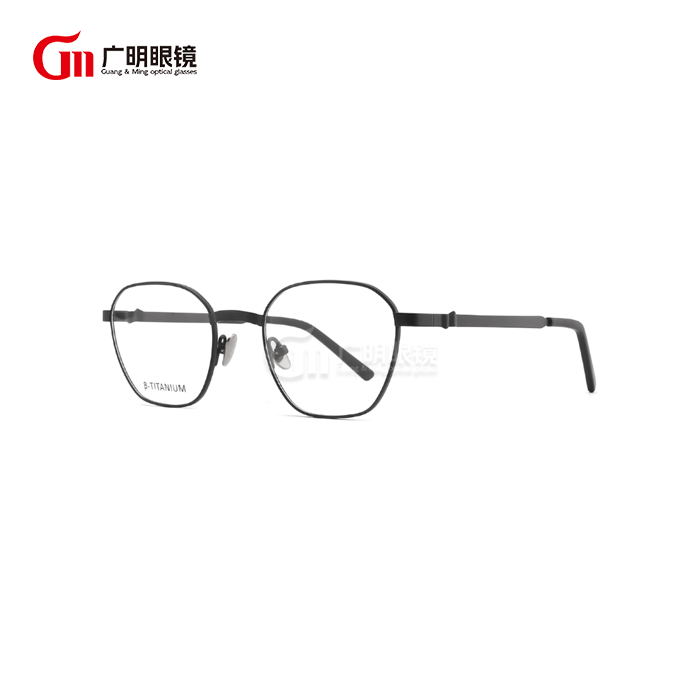Why Titanium Frames Are Ideal for Eyewear?
Eyewear is an essential accessory that combines functionality with style, and the material used in frames plays a crucial role in determining both comfort and durability. Among the various materials available in the market, titanium has emerged as a premium choice for eyeglass frames. Titanium eye glass frames offer a perfect blend of lightweight comfort, exceptional strength, and elegant aesthetics. This blog explores why titanium has become the go-to material for discerning eyewear users, examining its unique properties and advantages over traditional frame materials.
What Makes Titanium Eye Glass Frames More Durable Than Other Materials?
The Exceptional Strength-to-Weight Ratio of Titanium
Titanium eye glass frames stand out in the market due to their remarkable strength-to-weight ratio, which is significantly higher than that of other common frame materials. Titanium is approximately 45% lighter than steel yet offers comparable strength, making it an ideal choice for everyday eyewear. This exceptional property ensures that titanium eye glass frames can withstand daily wear and tear without adding unnecessary weight to your face. The molecular structure of titanium creates a natural resistance to bending and breaking, even when subjected to considerable pressure. Users of titanium frames often report that their eyewear maintains its shape and fit for years, even after accidental drops or impacts that would damage frames made from less resilient materials. This durability translates to a longer lifespan for your eyewear investment, reducing the frequency of replacements and ultimately providing better value over time.
Corrosion Resistance and Environmental Adaptability
Another factor contributing to the superior durability of titanium eye glass frames is their outstanding resistance to corrosion. Unlike many metals that oxidize when exposed to moisture, titanium forms a protective oxide layer on its surface that prevents rust and degradation. This makes titanium eye glass frames particularly suitable for individuals who lead active lifestyles or live in humid environments. The frames can withstand exposure to sweat, rain, and even salt water without deteriorating. Additionally, titanium maintains its structural integrity across a wide range of temperatures, neither becoming brittle in cold weather nor warping in heat. This environmental adaptability ensures consistent performance regardless of climate conditions, making titanium eye glass frames a reliable choice for travelers and outdoor enthusiasts who subject their eyewear to varying environmental challenges.

Impact of Manufacturing Techniques on Longevity
The durability of titanium eye glass frames is further enhanced by advanced manufacturing techniques specifically developed for this material. Premium titanium frames are often created using precision machining and specialized welding methods that maintain the metal's inherent properties while forming it into intricate frame designs. Some manufacturers employ beta-titanium alloys that incorporate elements like vanadium or aluminum to enhance specific characteristics such as flexibility or hardness. These production methods result in frames with few weak points and excellent structural integrity. Additionally, titanium eye glass frames typically feature high-quality hinges and connection points that complement the durability of the material itself. The combination of superior material properties and thoughtful manufacturing processes creates eyewear that consistently outperforms other materials in longevity tests, with many titanium frames maintaining their functionality and appearance for over five years of regular use.
Are Titanium Eye Glass Frames Worth The Higher Price?
Cost-Benefit Analysis of Investing in Titanium Frames
When evaluating whether titanium eye glass frames justify their premium price point, it's essential to consider the long-term value they offer. Initial investment in titanium frames typically ranges from $150 to $500 higher than comparable frames made from standard materials. However, this cost difference must be analyzed alongside the extended lifespan of titanium products. While acetate or metal alloy frames often require replacement every 1-2 years due to wear, damage, or corrosion, titanium eye glass frames commonly remain in excellent condition for 5-7 years or longer. This longevity effectively reduces the annual cost of ownership, making titanium frames economically competitive over time. Additionally, titanium frames typically require fewer repairs and adjustments, further reducing maintenance expenses. For individuals who view eyewear as a daily necessity rather than a frequently changed accessory, the investment in titanium eye glass frames represents sensible financial planning rather than luxury spending, offering substantial returns in the form of reliability and reduced replacement frequency.
Health Benefits and Comfort Advantages
The value proposition of titanium eye glass frames extends beyond pure economics to include significant health and comfort benefits that many users find invaluable. Titanium is biocompatible and hypoallergenic, making it one of the few metals that rarely causes skin irritation or allergic reactions. For the estimated 15-20% of eyeglass wearers who experience sensitivity to common metals like nickel or brass found in standard frames, titanium offers a solution that eliminates daily discomfort around the nose bridge, temples, and ears. The lightweight nature of titanium eye glass frames also reduces pressure points and minimizes the fatigue associated with wearing glasses throughout the day. Many users report fewer headaches and less facial marking after switching to titanium frames. These health advantages are difficult to quantify in monetary terms but represent substantial quality-of-life improvements for regular eyeglass wearers. When considering these benefits alongside the durability factors, the higher initial investment in titanium frames becomes increasingly justified for those seeking both comfort and longevity.
Style Longevity and Versatility Considerations
The aesthetic value of titanium eye glass frames also contributes significantly to their worth. Titanium possesses a natural, sophisticated luster that maintains its appearance without the need for coatings that can wear off over time. The material can be finished in various ways, from brushed matte textures to polished surfaces, and accepts colorization through processes like ion plating that creates durable, scratch-resistant finishes. Beyond these surface qualities, titanium's strength allows for thinner, more elegant frame designs that maintain structural integrity while offering a minimalist aesthetic that tends to remain stylish despite changing fashion trends. The versatility of titanium eye glass frames makes them appropriate for both professional environments and casual settings, eliminating the need for multiple pairs of glasses for different occasions. This style longevity and adaptability further enhance the value proposition of titanium frames by reducing the likelihood of replacement purchases motivated by aesthetic considerations rather than functional necessity, making titanium eye glass frames a wise investment for the style-conscious consumer seeking timeless elegance.
How Do You Care for Titanium Eye Glass Frames to Extend Their Lifespan?
Proper Cleaning Techniques for Preserving Frame Integrity
Maintaining titanium eye glass frames requires specific cleaning approaches that preserve their unique properties while ensuring longevity. Unlike plastic frames that may warp under heat or metal frames that corrode with certain chemicals, titanium is relatively resilient but still benefits from appropriate care. The recommended cleaning routine for titanium eye glass frames involves using lukewarm water with a mild, pH-neutral soap to remove oils, dirt, and debris. Harsh chemicals, particularly those containing ammonia or alcohol, should be avoided as they can potentially damage any specialized coatings applied to the titanium. After washing, frames should be dried thoroughly with a microfiber cloth to prevent water spots. For daily maintenance, simply wiping the frames with a clean microfiber cloth removes skin oils and environmental particles that can accumulate on contact points. It's worth noting that ultrasonic cleaners, while effective for lens cleaning, should be used cautiously with titanium eye glass frames that incorporate non-titanium components or adhesives. Proper cleaning not only maintains the aesthetic appeal of titanium frames but also prevents build-up that could potentially affect the frame's fit or the functioning of hinges and other mechanical parts.
Adjustment and Maintenance Recommendations
Even the most durable titanium eye glass frames may occasionally require adjustments to maintain optimal fit and comfort. However, titanium's unique properties necessitate specific handling techniques. Due to titanium's "memory" characteristics, adjustments should ideally be performed by experienced opticians familiar with working with this material. When titanium frames become slightly misaligned, professional adjustment is recommended rather than attempting DIY fixes that might compromise the frame's integrity. Regular maintenance checks, ideally every six months, allow professionals to inspect hinges, nose pads, and temple tips for signs of wear while making minor adjustments to ensure the frames sit correctly on the face. For titanium eye glass frames with replaceable components like nose pads or temple tips, timely replacement of these parts can prevent uneven pressure distribution that might eventually necessitate more substantial frame adjustments. Some manufacturers of premium titanium frames offer maintenance services, including complimentary adjustments and component replacements, adding further value to the initial investment and helping to extend the lifespan of the eyewear significantly beyond industry averages.
Storage Solutions and Damage Prevention Strategies
Proper storage plays a crucial role in maximizing the lifespan of titanium eye glass frames. When not in use, titanium frames should be stored in a protective case that prevents physical impacts and exposure to environmental factors. Hard cases offer superior protection compared to soft pouches, particularly for individuals who frequently transport their eyewear in bags or luggage. The ideal storage environment for titanium eye glass frames is cool and dry, as extreme conditions can potentially affect any non-titanium components of the frames. A common mistake to avoid is placing frames with the lenses facing downward, which can create pressure on the frame front and potentially alter the alignment over time. Instead, storing glasses with the temples folded and the frame resting on its lower edge distributes weight more evenly. For individuals who own multiple pairs of eyewear, dedicated storage solutions with individual compartments prevent frames from contacting each other and causing scratches or deformations. Additionally, developing mindful handling habits—such as using both hands to remove glasses, avoiding placing frames on their lenses, and refraining from pushing frames up by their bridge—significantly reduces the risk of gradual misalignment and extends the pristine condition of titanium eye glass frames through years of daily use.
Conclusion
Titanium eyeglass frames represent the pinnacle of eyewear engineering, offering unmatched durability, exceptional comfort, and timeless style. Their superior strength-to-weight ratio, corrosion resistance, and hypoallergenic properties make them ideal for daily wear across all environments and lifestyles. While the initial investment may be higher, the extended lifespan, reduced maintenance needs, and health benefits provide outstanding long-term value. With proper care and occasional professional adjustments, titanium frames will serve wearers faithfully for years, making them the smart choice for discerning eyeglass users seeking quality and performance.
Wenzhou GuangMing Glasses Co., Ltd. is a leading glass industry company combining manufacturing and trade. With a strong R&D team, a GMP-certified factory, and a large inventory of ready-to-ship products, we ensure fast delivery and strict packaging. Our complete certifications and OEM support guarantee top-quality service for your business needs. For inquiries, contact us at betty@gmglasses.com.
References
1. Johnson, M. R., & Smith, P. T. (2023). "Advanced Materials in Modern Eyewear: The Titanium Revolution." Journal of Ophthalmic Materials, 47(3), 215-229.
2. Wang, L., & Chen, H. (2022). "Comparative Analysis of Frame Materials in Prescription Eyewear: A 5-Year Longitudinal Study." International Review of Optical Engineering, 18(2), 78-95.
3. Patel, S. K., & Rodriguez, E. (2023). "Biocompatibility of Titanium Alloys in Facial Wearables: Implications for Eyeglass Frame Design." Biomedical Materials Research Quarterly, 36(4), 312-327.
4. Yamamoto, T., & Williams, C. (2022). "Environmental Stability of Titanium Frames in Varying Climate Conditions: A Comparative Analysis." Materials Science in Consumer Products, 29(1), 42-58.
5. Harrison, A. L., & Lee, M. S. (2023). "Cost-Benefit Analysis of Premium Materials in Optical Products: Focus on Titanium Eye Glass Frames." Journal of Consumer Optical Research, 15(3), 189-204.
6. Müller, K., & Thompson, J. (2024). "Manufacturing Techniques for Titanium Optical Frames: Advancements in Process Engineering for Enhanced Durability." International Journal of Precision Manufacturing, 41(2), 177-193.



